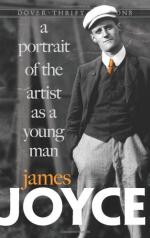The stout student who stood below them on the steps farted briefly. Dixon turned towards him, saying in a soft voice:
—Did an angel speak?
Cranly turned also and said vehemently but without anger:
—Goggins, you’re the flamingest dirty devil I ever met, do you know.
—I had it on my mind to say that, Goggins answered firmly. It did no one any harm, did it?
—We hope, Dixon said suavely, that it was not of the kind known to science as a Paulo post FUTURUM.
—Didn’t I tell you he was a smiler? said Temple, turning right and left. Didn’t I give him that name?
—You did. We’re not deaf, said the tall consumptive.
Cranly still frowned at the stout student below him. Then, with a snort of disgust, he shoved him violently down the steps.
—Go away from here, he said rudely. Go away, you stinkpot. And you are a stinkpot.
Goggins skipped down on to the gravel and at once returned to his place with good humour. Temple turned back to Stephen and asked:
—Do you believe in the law of heredity?
—Are you drunk or what are you or what
are you trying to say? asked
Cranly, facing round on him with an expression of
wonder.
—The most profound sentence ever written, Temple said with enthusiasm, is the sentence at the end of the zoology. Reproduction is the beginning of death.
He touched Stephen timidly at the elbow and said eagerly:
—Do you feel how profound that is because you are a poet?
Cranly pointed his long forefinger.
—Look at him! he said with scorn to the others. Look at Ireland’s hope!
They laughed at his words and gesture. Temple turned on him bravely, saying:
—Cranly, you’re always sneering at me. I can see that. But I am as good as you any day. Do you know what I think about you now as compared with myself?
—My dear man, said Cranly urbanely, you are incapable, do you know, absolutely incapable of thinking.
—But do you know, Temple went on, what I think of you and of myself compared together?
—Out with it, Temple! the stout student cried from the steps. Get it out in bits!
Temple turned right and left, making sudden feeble gestures as he spoke.
—I’m a ballocks, he said, shaking his head in despair. I am and I know I am. And I admit it that I am.
Dixon patted him lightly on the shoulder and said mildly:
—And it does you every credit, Temple.
—But he, Temple said, pointing to Cranly, he is a ballocks, too, like me. Only he doesn’t know it. And that’s the only difference I see.
A burst of laughter covered his words. But he turned again to Stephen and said with a sudden eagerness:
—That word is a most interesting word. That’s the only English dual number. Did you know?




